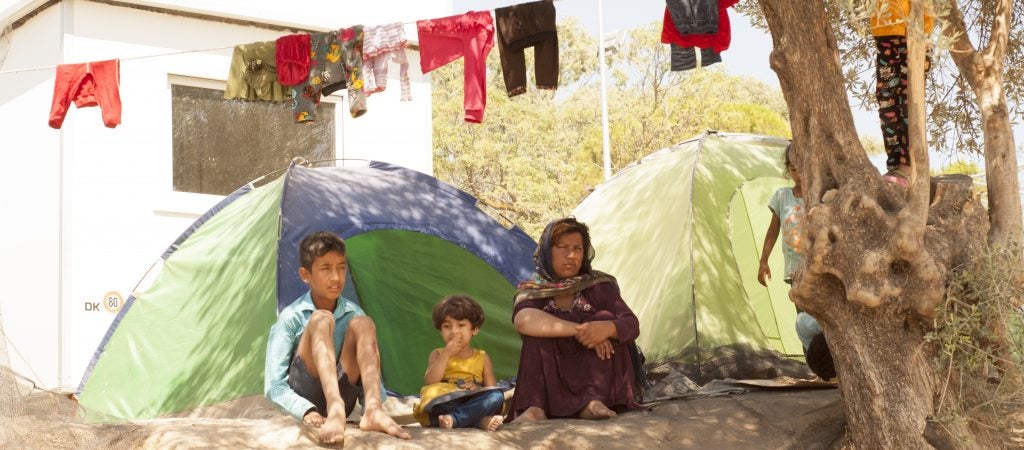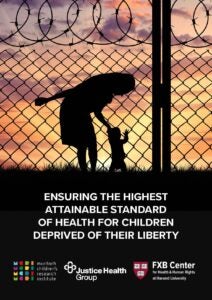Call for Paper Submissions
The Health and Human Rights Journal (HHRJ), co-published by the FXB Center and the Drexel University Dornsife School of Public Health, is accepting submissions for a special section on distress migration and the right to health which will include papers that examine the relationships between health care, social justice, human rights, and migration. Guest Editors: Stefano Angeleri, PhD and Jacqueline Bhabha, JD, MSc.
Papers and perspective essays must be submitted by April 30, 2024.
Details and author guidelines are available here!
The program at a glance
Migration is one of the central moral and governance issues of our time. Conflict, war, violence, natural disasters and a host of other seemingly unstoppable factors have for the whole of human history catalyzed the mass movement and mass displacement of people across the world. Over the past decade alone, war, hunger and poverty have displaced more people than at any intervening time since WWII, challenging social, economic and political frameworks. As people move from one region of the globe to another, they transcend borders, cultures and jurisdictions, creating a multi-faceted protection, governance and political challenge unlike any other. With no global framework in place to manage this complex phenomenon, individual countries and governments enact micro level policies with little or no regard for the global context, further exacerbating human suffering and eroding human rights. The urgency of advancing quality research to inform thoughtful policy and training the next generation of advocates on these issues could not be greater.
The Harvard FXB Center for Health and Human Rights (FXB Center) has assumed a leadership role in in this endeavor. Building on FXB’s Director of Research Professor Jacqueline Bhabha’s two decades of academic and policy work on issues of distress migration and child migrants, as well as data generated throughout the past 10 years, the FXB Center has established itself as one of, if not the center of excellence in the study and policy development on distress migration. It is widely regarded as a thought leader in the field, with its members engaged in policy making, research and training of students, advocates and practitioners globally. Over the past 10 years, the Distress Migration program at the FXB Center has undertaken primary, pioneer research on key migration and displacement issues, gathering primary data on evolving crises in Europe, the Americas, Africa, the Middle East and South East Asia. The center has generated peer reviewed research, targeted policy briefs and recommendations, and developed a comprehensive and multidisciplinary summer program on migration and refugee studies as part of its pedagogical agenda.
Our Team
Program’s areas of activity
The Program supports activities in four interrelated areas:
Our Work
Highlighted Projects
Ensuring The Highest Attainable Standard of Health for Children Deprived of Their Liberty
A team of researchers from the Murdoch Children’s Research Institute (MCRI) in Melbourne, Australia, the Justice Health Group at Curtin University, and the François-Xavier Bagnoud (FXB) Center for Health and Human Rights at Harvard University collaborated on identifying, critiquing, and synthesizing current standards for healthcare for children deprived of their liberty in order to shine a light on one of the most neglected areas in the protection of children.
Children who experience deprivation of liberty are distinguished by complex health problems that typically precede and contribute to their detention, and that may be further compounded by experiences of detention, particularly when the quality of healthcare in detention is suboptimal. With more than seven million children experiencing deprivation of liberty globally each year, the health of these children is important to global health and to efforts to reduce health inequalities. Despite this, remarkably little is known about either the health status of children deprived of liberty, or the health services available to them in these settings. Similarly, very little is known about children’s health outcomes after being deprived of liberty. The available evidence suggests that health services in places of detention are often inadequate, although the bulk of the evidence comes from a handful of high income, mostly Western countries.
The aim of this report is to identify gaps in the system and assist the United Nations Task Force (UNTF) in its efforts to support the implementation of the UN Convention on the Rights of the Child (UNCRC) and ensure that all children, including those deprived of their liberty in all settings, achieve the highest attainable standard of health. Setting and implementing minimum standards for healthcare in detention can help to drive improvements in the quality of care, and thereby improve health outcomes for children who experience deprivation of liberty. Read the full report here.
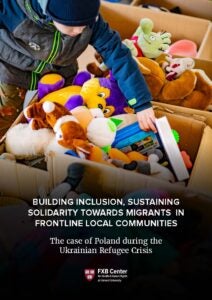 The availability and persistence of local community solidarity are crucial resources for distress migrants, as they cope with the consequences of ruptured lives. However, this solidarity is neither inherent nor permanent. It is rather a fragile and finite resource that can erode if not properly sustained and reinforced. Anecdotal data from the field shows that when states fail to accompany and support their citizens in their spontaneous expression of solidarity toward distress migrants, solidarity rapidly dissipates and is replaced by fatigue, resentment and eventually outright hostility.
The availability and persistence of local community solidarity are crucial resources for distress migrants, as they cope with the consequences of ruptured lives. However, this solidarity is neither inherent nor permanent. It is rather a fragile and finite resource that can erode if not properly sustained and reinforced. Anecdotal data from the field shows that when states fail to accompany and support their citizens in their spontaneous expression of solidarity toward distress migrants, solidarity rapidly dissipates and is replaced by fatigue, resentment and eventually outright hostility.
This preliminary empirical study’s goals are to document the factors that generate local solidarity and examine whether generous, well implemented state policies fueled by state actors’ preemptive attention to predictable needs can protect local communities from fatigue, and instead sustain solidarity and social inclusion of distress migrants over time.
To achieve this goal, the FXB Center conducted exploratory, qualitative research in 5 frontline local communities in Poland. Poland was chosen because of its state-driven vigorous and welcoming response to the very sizeable numbers of fleeing Ukrainians crossing into Poland after the Russian invasion in February, 2022. The dramatic asymmetry in the Polish response to Ukrainians arriving at Poland’s eastern border (with Ukraine) compared to all other recent refugee arrivals provides an additional lens for examining the impact of the different types of state engagement on local responses to distress migrants, responses that range from solidarity to virulent anti-migrant sentiment. Read the full report here.
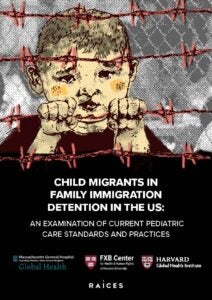 Between 2017 and 2021, more than half a million children were detained in immigration detention, with more than 200,000 of these children being held for more than 72 hours. Violating basic children’s rights, the US continues to detain children for lengthy and arbitrary periods of time, placing them in detention facilities unsuitable for child health and safety. Furthermore, reporting and oversight from governmental and non-governmental agencies has documented devastatingly harmful conditions for children in family immigration detention including separation from parents, the use of prison facilities inappropriate for housing children, and limited access to qualified medical professionals leading to grave physical and mental health consequences. Medical studies have documented long-term consequences of detention on children in the US and around the world; however, to our knowledge there are no systematic studies describing the quality of pediatric health care based on primary medical documentation within the US family immigration detention system.
Between 2017 and 2021, more than half a million children were detained in immigration detention, with more than 200,000 of these children being held for more than 72 hours. Violating basic children’s rights, the US continues to detain children for lengthy and arbitrary periods of time, placing them in detention facilities unsuitable for child health and safety. Furthermore, reporting and oversight from governmental and non-governmental agencies has documented devastatingly harmful conditions for children in family immigration detention including separation from parents, the use of prison facilities inappropriate for housing children, and limited access to qualified medical professionals leading to grave physical and mental health consequences. Medical studies have documented long-term consequences of detention on children in the US and around the world; however, to our knowledge there are no systematic studies describing the quality of pediatric health care based on primary medical documentation within the US family immigration detention system.
The Refugee and Immigrant Center for Education and Legal Services (RAICES), the Child Health Immigration Research Team based out of the Massachusetts General Hospital (MGH) Asylum Clinic at the MGH Center for Global Health, and the FXB Center for Health and Human Rights at Harvard University, collaborated to analyze the medical records of 165 children, between 6 months and 18 years old, detained at Karnes County Family Residential Center (KCFRC) between June 2018 and October 2020.
Broadly, we found that existing health issues and care needs relating to physical and mental health were under-identified due to poor screening and minimal documentation of medical care, resulting in fragmentated and inadequate medical care. During prolonged detention the children in the study had limited access to basic healthcare, including key screenings and management of acute medical and mental health issues. Read the full report here.
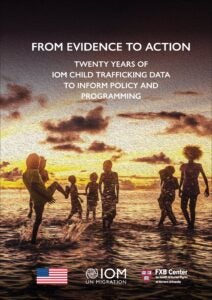 Human trafficking is a multi-billion-dollar criminal industry in which traffickers generate profits from the exploitation of millions worldwide. Widely regarded as an urgent human rights issue, the crime is difficult to assess due to its hidden nature, the lack of resources focused on identifying and serving victims, and the reluctance of victims and witnesses to come forward due to manipulation, fear, violent threats, shame, language barriers, or mistrust of authorities. One of the biggest evidence gaps on human trafficking pertains to the trafficking of children. Administrative data on trafficking is one of the only available data sources available on trafficked children because collection of primary data from children on such a sensitive topic, for example, through household surveys, is extremely challenging or impossible for ethical and practical reasons. In early 2021, the International Organization for Migration (IOM) and the FXB Center for Health and Human Rights at Harvard University initiated a collaboration to produce the first global report on child trafficking utilizing IOM’s Victim of Trafficking Database (VoTD), the largest international, administrative database on victims of human trafficking in the world. In particular, the VoTD contains primary data collected from more than 69,000 victims of human trafficking of all ages and genders (more than 13,000 children), collected in a spam of 20 years. This is the first global study that aims to yield valuable insights into the dynamics, trends and patterns that characterize global child trafficking, further contributing to larger international efforts to narrow the knowledge gap around the phenomenon. Read the full report here.
Human trafficking is a multi-billion-dollar criminal industry in which traffickers generate profits from the exploitation of millions worldwide. Widely regarded as an urgent human rights issue, the crime is difficult to assess due to its hidden nature, the lack of resources focused on identifying and serving victims, and the reluctance of victims and witnesses to come forward due to manipulation, fear, violent threats, shame, language barriers, or mistrust of authorities. One of the biggest evidence gaps on human trafficking pertains to the trafficking of children. Administrative data on trafficking is one of the only available data sources available on trafficked children because collection of primary data from children on such a sensitive topic, for example, through household surveys, is extremely challenging or impossible for ethical and practical reasons. In early 2021, the International Organization for Migration (IOM) and the FXB Center for Health and Human Rights at Harvard University initiated a collaboration to produce the first global report on child trafficking utilizing IOM’s Victim of Trafficking Database (VoTD), the largest international, administrative database on victims of human trafficking in the world. In particular, the VoTD contains primary data collected from more than 69,000 victims of human trafficking of all ages and genders (more than 13,000 children), collected in a spam of 20 years. This is the first global study that aims to yield valuable insights into the dynamics, trends and patterns that characterize global child trafficking, further contributing to larger international efforts to narrow the knowledge gap around the phenomenon. Read the full report here.
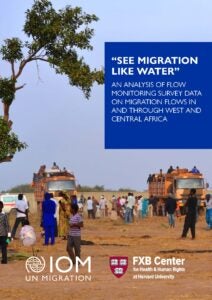 This FXB Center and International Organization for Migration (IOM) report analyzes intersecting aspects of migrant vulnerability across the most popular West and Central African migration routes – examining risk and protective factors at the individual, household, community, and structural level – and provides recommendations to protect migrants. Watch the FXB Center’s Professor Jacqueline Bhabha and Dr. Vasileia Digidiki discuss the report’s findings with IOM researchers here, and read the report in English and French.
This FXB Center and International Organization for Migration (IOM) report analyzes intersecting aspects of migrant vulnerability across the most popular West and Central African migration routes – examining risk and protective factors at the individual, household, community, and structural level – and provides recommendations to protect migrants. Watch the FXB Center’s Professor Jacqueline Bhabha and Dr. Vasileia Digidiki discuss the report’s findings with IOM researchers here, and read the report in English and French.

